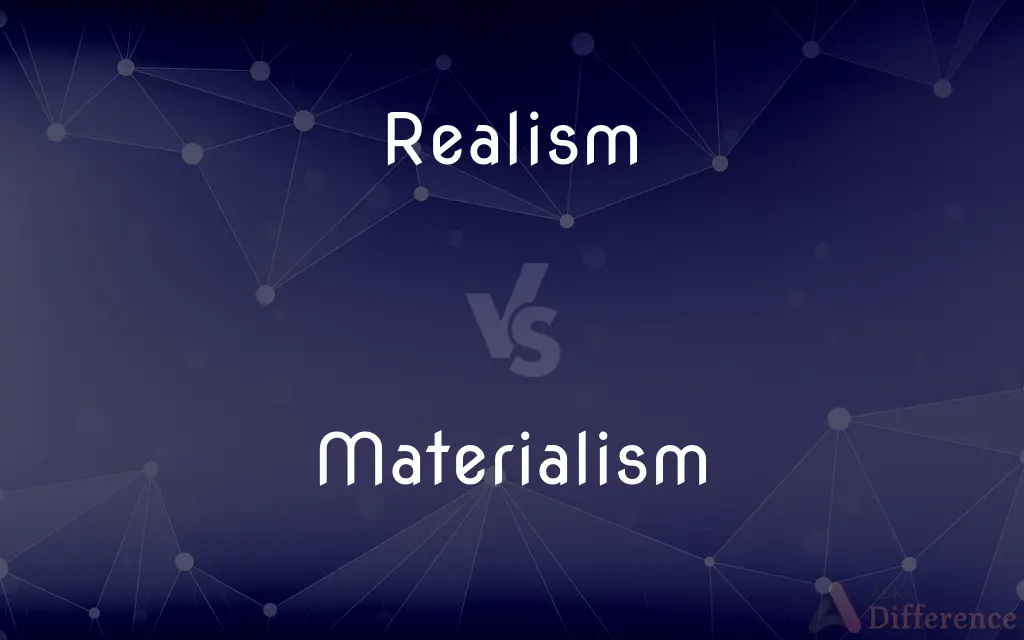Realism vs. Materialism — What's the Difference?
By Maham Liaqat & Fiza Rafique — Updated on April 16, 2024
Realism prioritizes the existence of a reality independent of perceptions, while materialism focuses on the physical world as the foundation of all reality.

Difference Between Realism and Materialism
Table of Contents
ADVERTISEMENT
Key Differences
Realism asserts that reality exists independently of our sensory experiences or perceptions, suggesting that objects have properties and existence even when not observed. Materialism, on the other hand, grounds its philosophy in the belief that only physical matter exists and that all phenomena, including consciousness, are the result of material interactions.
Realism often involves discussions on the abstract and non-material, such as ideas and numbers, considering them as part of the objective reality. In contrast, materialism strictly denies the existence of non-physical entities, asserting that observable, physical substances constitute the entirety of reality.
In the realm of science, realism supports the view that the theories and models of science attempt to describe the world as it truly is. Materialism, whereas, posits that these theories and observations are strictly manifestations of material conditions and interactions.
Realism may accommodate a variety of theories including those that consider abstract moral truths as part of objective reality. Materialism, however, typically aligns with more concrete approaches to ethics, rooted in the physical conditions and outcomes of actions.
In art and literature, realism focuses on depicting life and society as it is, often highlighting everyday activities and experiences. Materialism, in literary criticism and philosophy, would emphasize the material conditions and socio-economic contexts that shape artistic expressions.
ADVERTISEMENT
Comparison Chart
Definition of Reality
Reality exists independently of perception.
Reality strictly consists of physical matter.
Focus
Includes both material and immaterial aspects.
Solely on material, physical existence.
In Science
Aims to describe the world as it is.
Sees theories as products of material conditions.
In Ethics
Can include abstract moral truths.
Focuses on physical outcomes and conditions.
Application in Arts
Depicts societal and everyday realities.
Emphasizes material conditions of society.
Compare with Definitions
Realism
In science, the idea that theories should correspond to actual states of affairs.
Scientific realism involves commitment to the truth of scientific theories.
Materialism
In philosophy, the rejection of non-material entities.
Materialists deny the existence of the soul as a non-material entity.
Realism
Belief in portraying “reality” in art and literature.
Realist painters depict ordinary life scenes with no embellishment.
Materialism
In art, the focus on depicting the physical and economic conditions of life.
A materialist approach in literature might focus on the economic struggles of characters.
Realism
In philosophy, the acceptance of the existence of abstract entities.
Numbers exist in realism even without physical form.
Materialism
Focus on economic and social conditions influencing culture and society.
Marxist theories are often materialistic in nature.
Realism
Understanding that objects exist independently from observation.
The moon exists even if no one is looking at it.
Materialism
Viewing science as a product of the material brain and historical conditions.
Materialism would argue that scientific theories evolve from the physical brain’s capabilities and social context.
Realism
In international relations, the view that states act primarily in pursuit of their own self-interest.
Realists argue that diplomacy is a tool for achieving national goals.
Materialism
Belief that only physical matter exists and everything arises from material interactions.
Consciousness is seen as a result of brain processes.
Realism
An inclination toward literal truth and pragmatism.
Materialism
Materialism is a form of philosophical monism that holds that matter is the fundamental substance in nature, and that all things, including mental states and consciousness, are results of material interactions. According to philosophical materialism, mind and consciousness are by-products or epiphenomena of material processes (such as the biochemistry of the human brain and nervous system), without which they cannot exist.
Realism
The representation in art or literature of objects, actions, or social conditions as they actually are, without idealization or presentation in abstract form.
Materialism
(Philosophy) The doctrine that physical matter is the only reality and that everything, including thought, feeling, mind, and will, can be explained in terms of matter and physical phenomena.
Realism
The scholastic doctrine, opposed to nominalism, that universals exist independently of their being thought.
Materialism
The theory or attitude that physical well-being and worldly possessions constitute the greatest good and highest value in life.
Realism
The modern philosophical doctrine, opposed to idealism, that objects exist independently of their being perceived.
Materialism
Concern for possessions or material wealth and physical comfort, especially to the exclusion of spiritual or intellectual pursuits.
Realism
A concern for fact or reality and rejection of the impractical and visionary.
Materialism
Constant concern over material possessions and wealth; a great or excessive regard for worldly concerns.
Realism
An artistic representation of reality as it is.
Materialism
(philosophy) The philosophical belief that nothing exists beyond what is physical.
Realism
(sciences) The viewpoint that an external reality exists independent of observation.
Materialism
Material substances in the aggregate; matter.
Realism
(philosophy) A doctrine that universals are real—they exist and are distinct from the particulars that instantiate them.
Materialism
The doctrine of materialists; materialistic views and tenets; called also philosophical materialism.
The irregular fears of a future state had been supplanted by the materialism of Epicurus.
Realism
As opposed to nominalism, the doctrine that genera and species are real things or entities, existing independently of our conceptions. According to realism the Universal exists ante rem (Plato), or in re (Aristotle).
Materialism
The tendency to give undue importance to material interests as contrasted with spiritual concerns; devotion to the material nature and its wants.
Realism
Fidelity to nature or to real life; representation without idealization, and making no appeal to the imagination; adherence to the actual fact.
Materialism
Material substances in the aggregate; matter.
Realism
The practise of assessing facts and the probabilities of the consequences of actions in an objective manner; avoidance of unrealistic or impractical beliefs or efforts. Contrasted to idealism, self-deception, overoptimism, overimaginativeness, or visionariness.
Materialism
A desire for wealth and material possessions with little interest in ethical or spiritual matters
Realism
The attribute of accepting the facts of life and favoring practicality and literal truth
Materialism
(philosophy) the philosophical theory that matter is the only reality
Realism
(philosophy) the philosophical doctrine that physical object continue to exist when not perceived
Realism
The state of being actual or real;
The reality of his situation slowly dawned on him
Realism
An artistic movement in 19th century France; artists and writers strove for detailed realistic and factual description
Realism
(philosophy) the philosophical doctrine that abstract concepts exist independent of their names
Common Curiosities
How does realism affect our understanding of science?
Realism promotes the idea that scientific theories have a true correspondence to the external world, enhancing the pursuit of objective truth.
What implications does materialism have on ethics?
Materialism often leads to ethical frameworks based on physical outcomes, practicality, and tangible benefits.
Can realism and materialism be compatible?
In some respects, yes, particularly in natural sciences where both can agree on the material basis of phenomena but differ on the existence of abstract concepts.
What is the core difference between realism and materialism?
Realism is about the existence of reality independently of our perceptions, while materialism focuses only on physical matter as real.
Can materialism explain all aspects of human experience?
Critics argue that materialism cannot adequately address non-material aspects such as emotions and consciousness fully.
How does realism approach the study of international relations?
Realism in international relations emphasizes practical and strategic considerations, viewing states as actors pursuing power.
What do materialists believe about the afterlife?
Materialists generally deny the existence of an afterlife, seeing life as confined to physical existence.
How does realism differ from idealism in philosophy?
Realism asserts the independent existence of the world, while idealism posits that reality is mentally constructed.
How does realism influence art and literature?
Realism in art and literature focuses on depicting life as it is, often highlighting mundane, everyday activities.
Why is materialism important in social sciences?
Materialism provides a framework for analyzing societal structures and behaviors through the lens of material conditions and economic factors.
How do realism and materialism view the concept of mind and consciousness?
Realism can accommodate non-physical aspects of consciousness, whereas materialism views them as purely brain-based phenomena.
Is realism considered outdated in contemporary philosophy?
Realism remains relevant, especially in debates concerning the nature of truth, science, and knowledge.
What role does materialism play in economic theories?
Materialism is central to many economic theories, especially Marxism, which views economic conditions as the base of all social structures.
Does realism support the existence of universal moral truths?
Some realists support the idea of objective, universal moral truths existing independently of human beliefs or perceptions.
Can materialism account for artistic creativity?
Materialism explains creativity as arising from the brain's physical capabilities and socio-historical context, potentially overlooking the intrinsic value and spontaneity of artistic expression.
Share Your Discovery

Previous Comparison
Habit vs. Tendency
Next Comparison
Gaily vs. GaylyAuthor Spotlight
Written by
Maham LiaqatCo-written by
Fiza RafiqueFiza Rafique is a skilled content writer at AskDifference.com, where she meticulously refines and enhances written pieces. Drawing from her vast editorial expertise, Fiza ensures clarity, accuracy, and precision in every article. Passionate about language, she continually seeks to elevate the quality of content for readers worldwide.













































